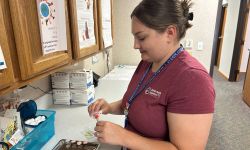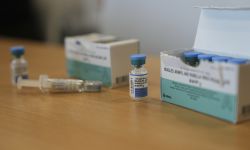“It’s like a miracle:” Monoclonal antibody use soars over 300% in Michigan

Oct. 29: Monoclonal antibody treatment gains ground in Michigan’s COVID fight
It felt like a war. And the doctors, nurses and health care workers at Sparrow Hospital in Lansing were losing.
“We’re battling out there, but no new troops are coming,” said Dr. Paul Entler, Sparrow’s Vice President of Quality and Performance Improvement.
Stories from the front
Bridge Magazine, Detroit Free Press and Michigan Radio are teaming up to report on Michigan hospitals during the coronavirus pandemic. We will be sharing accounts of the challenges doctors, nurses and other hospital personnel face as they work to treat patients and save lives. If you work in a Michigan hospital, we would love to hear from you. You can contact reporters Robin Erb rerb@bridgemi.com at Bridge, Kristen Jordan Shamus kshamus@freepress.com at the Free Press and Kate Wells katwells@umich.edu at Michigan Radio.
It was March, and Michigan’s third COVID-19 surge seemed to have no end in sight: 3,000, then 4,000, eventually more than 7,000 new daily cases on average at the peak in April.
Sparrow was running out of space. “It was really a grim situation…. We're looking at capacity, beds, our staffing models. And you always worry about the health care workers, where they just keep absorbing these blows,” Entler said.
Related:
- Michigan mask rule change: Many questions. Some answers. What to know.
- Mask mandate over for vaccinated in Michigan. Confusion for everyone else?
- Boarding a freighter in the Soo Locks to deliver 5 doses of COVID vaccine
- As Michigan reaches COVID vaccine mark, offices plan to welcome workers
- Michigan may not hit 70% vaccination rate until August, as demand falls
- Inside the third surge at Sparrow: A Lansing hospital in overflow
And he kept thinking about one of his own patients, who’d recently come into Sparrow’s small monoclonal antibody clinic a few days after testing positive for COVID.
“Within a few hours after the infusion, [my patient] said, ‘I don’t know what I got, but it was like a miracle drug,’” said Entler.

Now Entler was looking at the medical histories of the patients flooding his hospital. So many of them, he realized, would have qualified for monoclonal antibody treatment: lab-created proteins designed to help the immune system fight off the coronavirus in the early stages of infection.
The FDA first issued an Emergency Use Authorization for the therapy in November 2020, for patients who were at high risk of getting seriously ill. People 65 and older, as well as those with chronic health conditions like obesity, diabetes, and immunosuppressive diseases, qualified.
But by the week of March 24, only about 500 COVID Michigan patients were actually receiving monoclonal antibodies therapy each week. Yet early results from clinical trials suggested the drugs could reduce hospitalizations and deaths by up to 70 percent, and possibly even prevent infection altogether.
What if Sparrow’s inpatients had gotten this treatment sooner, Entler wondered. Maybe they wouldn’t have needed to be hospitalized.
“At that point, it was [the realization that] we really need to do mass efforts…. We knew we had to act fairly quickly, to try and get [this treatment to] those high-risk, non-vaccinated patients and the community that had early COVID.”
Since then, Entler said, he’s become convinced that monoclonal antibodies are effective.
“There's not a lot of things with COVID that we can say we know works. This is one of them.”
In just under a month, the number of COVID-19 patients in Michigan receiving monoclonal antibody treatments soared by more than 300 percent, from about 500 patients the week for March 24, to about 1,700 the week of April 21. (More recently, about 1,600 patients received it the week of April 28, and roughly another 1,200 the week of May 5.)
The state now represents 8 percent -10 percent of all reported such treatments in the US, according to the Michigan Department of Health and Human Services, with more than 10,000 Michigan residents having received the therapy so far.
It’s not just hospitals expanding their use of the antibodies. Teams of EMS workers, like those at Tri-County Medical Control Authority and Huron Valley Ambulance are going into people’s homes, hooking them up to an IV mixture of these lab-created proteins.
“This stuff emerged in November with very limited data,” said Dr. Bill Fales, MDHHS medical director for EMS, Trauma and Preparedness. “And now we're using it on a much, much more aggressive basis. I can't think of an intervention in my many years of medicine that that window … from emergence to [an] intervention [becoming common practice] has been so, so short.”

And frankly, no one is more stunned than Fales. Because just a few months ago, he literally couldn’t give most of this stuff away.
Stashing the surplus in a Lansing warehouse
Back in February, Fales had a problem. Michigan was using just 10 percent of its federally allocated monoclonal antibodies. He just couldn’t find more takers.
“We provided them to every hospital...whether they wanted it or not, they were getting an allocation,” said Fales, an ER doctor by training. “And then the hospital[s] started to say, ‘Well, wait a second, we're not using this stuff like we wanted to, or like we thought we would. So we don't want any more.’”
That’s because monoclonal antibodies can be a hassle, especially for hospitals short on space and staff in the midst of a pandemic.
Not only do patients have to be high-risk to qualify, they also have to get the treatment within a very limited window of time: within 10 days of testing positive. And because the FDA’s emergency authorization only extends to treating early, “mild to moderate” COVID infections before they progress, patients who are already admitted to the hospital for COVID don’t qualify. Those in the ER do, however, as well as patients admitted for non-COVID issues, like cardiac issues or labor.
Another complication: Currently, monoclonal antibodies can only be administered through an IV - which means you need to find beds where patients can come receive the infusion, without infecting non-COVID patients.
Many health systems told Fales they were just too overwhelmed to do that.
“The more hospitalizations a hospital experiences, the more stress and demands for service that puts on that hospital,” he said. “And it makes doing something like monoclonal antibody therapy even more challenging when they are getting beat up with COVID patients on the inpatient side.”
Plus, there just wasn’t much initial evidence the treatment even worked. Healthcare providers were skeptical, after months of seeing potential COVID treatments come into vogue, only to burn out or prove less effective under more study.
But Fales and his team couldn’t bear to just turn 90 percent of the state’s share of monoclonal antibodies away. Their temporary solution: stash some of the surplus in a warehouse in Lansing and hope that the tide turned.
Then March rolled around.
A third surge spurs willingness to try new things
Many of the state’s health systems, it turns out, needed three things for them to seriously invest in monoclonal antibodies: more time, more evidence, and another crisis.
And Michigan’s third COVID surge acted as a catalyst, just when those elements were starting to fall into place.
Over the winter, drugmakers released more studies that seemed to back up the early promise of monoclonal antibodies. One pharmaceutical giant, Eli Lilly, found a combination of two of its antibody therapies was even effective against the emerging B.1.1.7 variant: The group of patients who received the drugs had 70 percent fewer hospitalizations than the placebo group. And while the placebo group had 10 deaths (representing 2 percent of that group), the group receiving the monoclonal antibodies had none.
The results haven’t been published in a peer-reviewed journal yet. But Fales says they went a long way towards convincing hesitant health systems to give it a try.
“That’s really huge,” he said. “We didn’t have that back in November, December…. So I think that really is the combination of the clinical trial data, and it was just really reinforced by our own experience in Michigan.”
All throughout the winter and into the spring, Fales would point to the monoclonal antibody program Michigan Medicine, one of the first health systems to go all in on the therapy. As of May 2, nearly 1,000 high-risk COVID patients had received the treatment at U of M. Only 3 percent went on to be hospitalized. And not a single one has died of COVID.
But getting there required a leap of faith, and a lot of overtime.
“We needed people to just really step up and volunteer their time, at a time when they were already tired and burnt out and have been doing this [pandemic] for so long,” said Dr. Lindsay Petty, an infectious disease doctor at the University of Michigan and the medical director of the monoclonal antibody program.
First, they had to build a system that would take patients’ positive test results, and cross match their medical records to see if they qualified for the treatment. Calling patients to double-check that information and try to persuade them to come in, like, now, became a full-time job for some pharmacists.
And staffing the infusion centers meant nurses were pulling double duty on top of their work treating COVID inpatients.
“Nurses had to sign up for overtime, both on evenings and on weekends...Pharmacists worked evenings and weekends. They still work weekends,” Petty said. “But I think part of that worked out, too. Because we started doing this work, and we were reporting on our outcomes as we had to track them, to report them to the state. And then people felt encouraged. And pharmacists, as they were on these phone calls with patients, they were able to offer these high-risk patients a treatment that they felt like was going to help them.”
Running out of other options
Meanwhile, higher-ups at other hospitals were watching their inpatient numbers rise, and making the same calculations as Dr. Entler was at Sparrow: What if this could keep patients from overwhelming the system?
“The expansion of this therapy is important in light of what we are facing at the present time, with our hospital admissions at alarming levels in Southeast Michigan, but also across the state,” said Dr. Adnan Munkarah, Henry Ford Health System’s executive vice president and chief clinical officer, on April 15.
That’s when Henry Ford announced it was partnering with federal health officials to open a new monoclonal antibody infusion center in Detroit, as well as expanding the treatment at three of the system’s health centers.
Really, they had no other choice.
“Our bed occupancy at Henry Ford Health System currently is at 90 percent, and our test positivity rate continues to be hovering in the upper teens, and hit 20 percent a few days ago,” Munkarah said at the press conference. “...By increasing the access to this treatment, we are hoping to keep patients with COVID who are at high risk of progressing to a worse disease and being hospitalized, being out of the hospital and getting better at home.”
Part of a “new normal?”
Now that 50 percent of Michigan’s 16-and-over population has received at least one dose of the COVID vaccine, it looks like the rate of inoculations is starting to slow. If it turns out we can’t vaccinate our way out of the pandemic, then monoclonal antibodies may go from being an any-port-in-a-storm option, to an almost ordinary tool.
On April 29, Dr. Joneigh Khaldun, the state’s chief medical officer, sent out a memo to providers across Michigan: Health care workers need to “significantly expand their use” of the treatment, “with a goal of 50 percent of eligible qualifying patients … [receiving] this therapy within 10 days of developing symptoms.”
One wrinkle: patients who’ve received monoclonal antibodies need to wait 90 days to get the COVID vaccine. “If you’ve had that monoclonal antibody, it is going to keep you from being able to develop a nice, robust response to the vaccine,” infectious disease expert Dr. Kristin Englund said in a Cleveland Health Clinic blog post. “So that’s why we have to wait for 90 days until that monoclonal antibody has gotten out of your system.”
Certainly the drugmakers see potential here: Regeneron is running TV ads that appear to specifically target Black patients, in which people basically say the words “monoclonal antibodies” as many times as possible. Meanwhile, the pharmaceutical companies are hoping to get authorization for a simpler injection option, which would make monoclonal antibodies something doctors could give in their own offices as a shot.
“I think that has a whole lot of promise,” said Dr. Lindsay Petty. “Anything we can do to kind of speed up the process and make it simpler, the better. But I think ... monoclonal antibodies are here to stay.”
See what new members are saying about why they donated to Bridge Michigan:
- “In order for this information to be accurate and unbiased it must be underwritten by its readers, not by special interests.” - Larry S.
- “Not many other media sources report on the topics Bridge does.” - Susan B.
- “Your journalism is outstanding and rare these days.” - Mark S.
If you want to ensure the future of nonpartisan, nonprofit Michigan journalism, please become a member today. You, too, will be asked why you donated and maybe we'll feature your quote next time!








